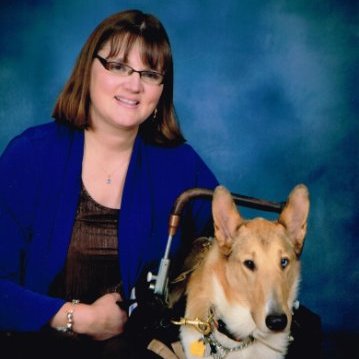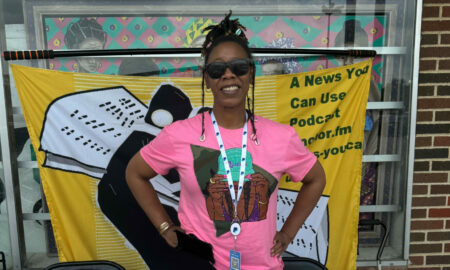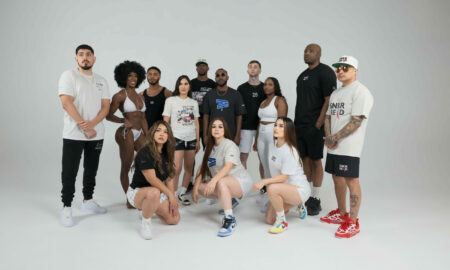

Today we’d like to introduce you to Kristin Hartness.
So, before we jump into specific questions about the business, why don’t you give us some details about you and your story.
I am disabled (Secondary Progressive Multiple Sclerosis). Symptoms started when I was 16. I was diagnosed just before I turned 21. I started using a service dog in 2001. He changed my life. He brought back so much independence to my daily activities and expanded my life in ways I never expected. I could not stop talking about how amazing this was. How I will never be without a service dog. How important it is for communities to know about and welcome service dogs. How other people can get service dogs.
In 2002, I was asked to allow my name to be put forward for an opening with Canines for Disabled Kids. I jumped at the opportunity. It was a way for me to help families in a much larger way that I could being just me. I have here for 15 years and loving it.
I live what I do. My life has limitations – my service dog (currently on my 3rd) – reduces them, giving me more access, more independence. I will always need some human help, but using my service dog keeps that at a minimum.
When I talk with families or businesses or communities, I talk about the reality of living my life differently because of my disability – the good and the challenging pieces all together. I talk about being disabled. Not “differently abled”. But owning my disability – the part of me that does not work the way it is supposed to. It is part of how I meet the world. I am successful, intelligent, and some days I am beautiful. I am not able to do everything the world has to offer (Are you?). But I can and do try new things, visit new places, taste new things and meet every challenge that comes my way. I do not hide from my limitations. I celebrate my successes.
You must be comfortable with your disability to fully embrace and benefit from a service dog. Shout from the mountain top – I am disabled and I am not ashamed.
I work every day to help children feel like I feel. Disability is not a bad word. It is nothing to be ashamed of. Changing words because others are uncomfortable acknowledging Disabilities, does not help me. I think it protects them.
Owning who I am helps me to help others. Being the executive director of CDK helps me to reach more families and help more children gain the independence and success with the use of a very special tool.
Canines for Disabled Kids (CDK) is a 501(C)(3) nonprofit which increases independence for children with disabilities and their families by building service dog partnerships, understanding and awareness throughout the community
While service dogs have been assisting individuals with disabilities for hundreds of years, not all service dog training programs are willing to provide trained dogs for a child. Industry estimates show there are over 500,000 school aged children with disabilities who would benefit from the use of a service dog, yet there are only approximately 5,000 service dogs working with school aged children.
The belief of some is children are not capable of handling the responsibilities that come with owning and working with a service dog. Additionally, it is difficult for families to find the right service dog training program for their child because it was hard for them to determine the skills a service dog program trained and many programs have geographic limitations. As a result, for many families, the process of searching for a service dog becomes overwhelming and frustrating so they give up.
CDK was founded in 1998 by individuals familiar with service dog industry who believed it was possible, by allowing an adult to be the responsible party through a facilitated relationship if needed, to train dogs that would assist children with disabilities. Their vision was to ensure that every child who could benefit from the personal independence a service dog provides is able to realize those benefits.
The founders wanted to ensure that families of children with disabilities receive personalized information and guidance so they knew where to look and the questions to ask when searching for a service dog training program. To do this they stated gathering information and building a data base of training programs across the country which contains information on the type and quality of service skills trained, geographic area served, and willingness to work with children. At the same time CDK began working with families to determine their child’s and family’s needs, identifying specific trained service dog skills to best assist the child and matching that information with the training program information in the database. The result is each family CDK works with receives a list of training program options tailored for them.
To increase the speed and success rate of children being connected to service dogs, CDK created a scholarship program designed to assist families with the cost of training a service dog. In addition to reducing the amount of time it takes the family to raise the money to purchase a service dog CDK Scholarships also encourage the training programs to be more willing to consider the placement of service dogs with children.
Next, CDK began developing education and advocacy programs to build gateways and raise service dog understanding in communities so that all service teams would be welcomed. CDK’s series of programs provide information to the public about service dogs, public access and their role with individuals overcoming the limitations of a variety of disabilities. These programs are offered across the country to schools, civic groups, businesses and other groups interested in learning more about how service dogs assist individuals and the regulations about service dogs as they relate to the Americans with Disabilities Act (ADA).
Today, through the generous support of our donors, CDK’s staff and volunteers continue making tremendous strides toward achieving the vision of our founders. With a data base of over 200 training programs across the country, CDK has helped more than 900 families determine that a service dog is the right tool for their child and connected them with a service dog training program. We have awarded 257 scholarships and the process of a child receiving their service dog has been reduced from over two years to an average of less than 2 years. We continue to raise service team awareness, understanding and access by spreading the message of service team understanding and access to thousands of people in all areas of the community each year through educational presentations, PSA’s, social media, interviews, etc.
While CDK is extremely proud of the life changing impact our services have had on the children and families we work with, there is much more to be done. Canines for Disabled Kids remains committed to achieving the vision of our founders by continually working to build partnerships and understanding which allow every child who can benefit from the use of a service dog has the opportunity to realize those benefits and achieve their own personal independence.
Great, so let’s dig a little deeper into the story – has it been an easy path overall and if not, what were the challenges you’ve had to overcome?
There are always challenges.
Challenges for the organization include making sure people know we are hear and what services we offer. Convincing communities to use our services rather than making it up as they go along. Obtaining funds from donors (individuals, communities, businesses) so that we can provide the services at no cost to the families and schools we work with.
CDK is not part of the service dog training industry. We exists outside of that but work with many who are inside. Sometimes we are not always in agreement. CDK is there to make sure a child gets what the need even if it is with an “out of the box” idea. CDK works to makes sure all options are open to the children we serve – even when that means making recommendations that some of our closest partners do not agree with.
Keeping everyone – trainers, businesses, school and families – in compliance with the ADA (Americans with Disabilities Act) is not always easy. Bringing people to the table, assuring access to service dogs and their partners, addressing question and concerns of the schools and businesses take time, skill, patience and knowledge. Concluding situations positively for all involved can take time – but a successful end is always rewarding!
Personal challenges affect me as well. Living with a disability, I have had to learn what my limitations are, adjust to them as they change, figure out how to conquer them so I and the organization can be successful.
CDK must balance how many families they can help, how many scholarships they can award with the funds donated and the staff and volunteers available.
I must balance my physical limitations with the work I want to complete each day, week, month and year. Balancing what I want to do with what I need to do (physical therapy, writing articles, working with families, medical appointments) can be challenging. I always search for the perfect balance – and push it to see if I can get one more thing accomplished.
CDK works like this as well – together the staff and volunteers are always stretching to see if we can get “one more” out of what we have.
We will continue to meet the challenges head on – and sometimes from the side. However we (and I) need to so we can be as successful as possible.
Canines for Disabled Kids – what should we know? What do you guys do best? What sets you apart from the competition?
Please put some of this from Our Story, which I entered earlier. CDK stands independently from all the training program options available in the US. It is important that CDK is able to talk about the industry – not just what one training program things or does not thinks is good or possible.
CDK holds all parties to the rules set by the ADA. That is important because many training programs tell you what they train – which may be higher than the ADA requires – but does not mean that other programs which train to the ADA standard are bad or wrong.
Communities and businesses can be misinformed with outdated information or only have part of the legal information which can lead to uncomfortable or hostile situations. Because CDK is independent – we can act in a way that does not favor one group over another.
What moment in your career do you look back most fondly on?
Every time I help a service dog user know they are a true team and have full access to greater independence I am proud.
As “hallmark” as that sounds I cannot name one moment to be the proudest because there are too many to pick just one.
Contact Info:
- Address: 255 Park Ave, Suite 601
Worcester MA 01609 - Website: http://www.caninesforkids.org/
- Phone: (978) 422-5299
- Email: info@canniesforkids.org








Image Credit:
Portraits by Michael Stone
Austin & Paris photo
Getting in touch: VoyageDallas is built on recommendations from the community; it’s how we uncover hidden gems, so if you know someone who deserves recognition please let us know here.

















